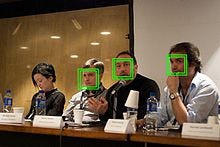Lawmakers Move To Ban Use of Facial Recognition Technology
New legislation comes following string of false arrests based on reliance on tech
It sounds so futuristic and cutting-edge: using biometrics — and particularly advanced facial-recognition technology — to help apprehend criminals and ensure their convictions.
But for Nijeer Parks, a 31-year-old Black man living in Paterson, NJ — and others like him — perhaps the reliance on such systems should remain a thing of science fiction movies and television cop shows.
Parks became the subject of a wrongful match by facial recognition scan in a serious crime in Woodbridge, NJ, 30-miles away.
The incident cost Parks 11 days in jail and a year-long legal nightmare to clear his name.
While facial recognition technology has become increasingly accurate, research has shown it is drastically more prone to error when trying to match the faces of darker skinned people. And because no federal guidelines exist to limit or standardize the use of facial recognition by law enforcement, states — and, more often, municipalities — are left to decide for themselves what, if anything, to do to control its use. Virginia recently became the fifth state to curtail the use of the facial recognition by police, while Portland, San Francisco, Oakland and Boston are among the cities outlawing it.

Now a group of members of Congress want to step in to change that by reintroducing the Facial Recognition and Biometric Technology Moratorium Act.
The bill responds to reports that hundreds of local, state, and federal entities, including law enforcement agencies, have used unregulated facial recognition technologies and research showing that that roughly half of U.S. adults are already in facial recognition databases, according to the sponsors of the legislation.
Those introducing this measure are doing so in both the House and Senate, and include Reps Ayanna Pressley (D-Mass), Pramila Jayapal (D-Wash), Rashida Tlaib (D-Mich) and Yvette Clarke (D-NY), along with Sens Edward Markey (D-Mass), Jeff Merkley (D-Ore.), Bernie Sanders (I-Vt.), Elizabeth Warren (D-Mass.), and Ron Wyden (D-Ore.).
“Facial recognition technology is flawed and systemically biased, and has exacerbated the criminalization and over-surveillance that Black and brown communities face,” said Pressley. “By banning government use of this discriminatory technology, our bill would boldly affirm the civil liberties of every person in this country and protect their right to live free of unjust surveillance by government and law enforcement. I’m proud to join my colleagues in re-introducing this bill.”
As this technology continues to proliferate, experts have found that facial recognition tools are significantly less accurate when analyzing biometric data from vulnerable and marginalized populations, bill sponsors said. For example, an analysis of facial recognition tools by the National Institute of Standards and Technology found that Black, brown, and Asian individuals were up to 100 times more likely to be misidentified than white male faces. Three Black men — including Nijeer Parks — have already been wrongfully arrested based on a false facial recognition match, and earlier this month, more than 40 leading civil rights and privacy groups called for a moratorium on law enforcement entities’ use of this technology.
The Facial Recognition and Biometric Technology Moratorium Act would:
Place a prohibition on the use of facial recognition technology by federal entities, which can only be lifted with an act of Congress;
Place a prohibition on the use of other biometric technologies, including voice recognition, gate recognition, and recognition of other immutable physical characteristics, by federal entities, which can only be lifted with an act of Congress;
Condition federal grant funding to state and local entities, including law enforcement, on those entities enacting their own moratoria on the use of facial recognition and biometric technology;
Prohibit the use of federal dollars for biometric surveillance systems;
Prohibit the use of information collected via biometric technology in violation of the Act in any judicial proceedings;
Provide a private right of action for individuals whose biometric data is used in violation of the Act and allow for enforcement by state Attorneys General; and
Allow states and localities to enact their own laws regarding the use of facial recognition and biometric technologies.
“We do not have to forgo privacy and justice for safety” said Markey. “This legislation is about rooting out systemic racism and stopping invasive technologies from becoming irreversibly imbedded in our society. We simply cannot ignore the technologies that perpetuate injustice, and that means that law enforcement should not be using facial recognition tools today. I urge my colleagues in Congress to join this effort and pass this important legislation.”
In July 2019, Rep. Pressley introduced bicameral legislation, along with Markey, Reps. Clarke and Tlaib, to ban the use of facial recognition technology in public housing.
“The perils of face recognition technology are not hypothetical — study after study and real life have already shown us its dangers. The technology’s alarming rate of inaccuracy when used against people of color has led to the wrongful arrests of multiple Black men including Robert Williams, an ACLU client. Giving law enforcement ever more powerful surveillance technology empowers constant surveillance, harms racial equity and is not the answer,” Kate Ruane, senior legislative counsel at the American Civil Liberties Union, said. “It’s past time to take action, and the Facial Recognition and Biometric Moratorium Act of 2021 is an important step to halt government use of face recognition technology.”
Correction: The crime Nijeer Parks was accused of took place in Woodbridge NJ. It was originally misreported. It has now been corrected.



